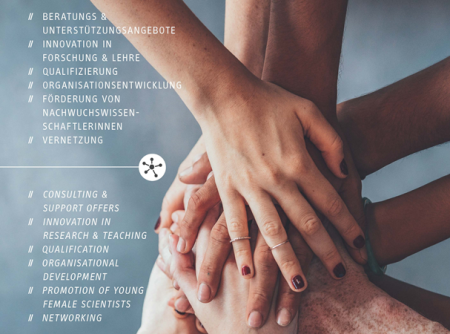Newsletter February 2021
Latest News |
|
|
|
How does research work?
How do I conduct research properly? This question was addressed by over 450 researchers from a wide range of disciplines at the digital "Methods Workshop on Qualitative Educational and Social Research" in early February 2021. In 18 virtual working groups, participants were able to exchange ideas under the expert guidance of renowned researchers, discuss work results, and learn about qualitative research practice. During the breaks, they had the opportunity to inform themselves about resources of qualitative research at a virtual "market of possibilities". The research workshop was hosted by the Center for Social World Research and Methodology Development. Read more
|
|
|
Save the Date! Ladies Night goes online!
This year, Ladies Night for Women in Engineering Sciences will take place in a new, digital format. The program will be offered online with synchronous and asynchronous program parts on April 22, 2021. The Ladies Night will be framed by digital info days including an online workshop, an award ceremony, a panel discussion and a digital market of opportunities. This way to the program
|
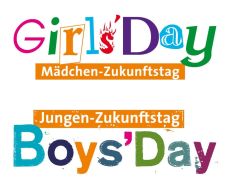
|
Strengthen the potential of girls & boys on Girls'Day/Boys'Day
Girls'Day and Boys'Day - Girls' Future Day and Boys' Future Day - will take place again on April 22, 2021. Join in and arouse interest in your field of work among students from grade 5 upwards, thus opening up a wide range of personnel resources for the future. On Girls' Day and Boys' Day, girls and boys broaden their range of career choices and learn about their individual strengths "among themselves." On the day of action, they meet female and male role models digitally or in person - this inspires and motivates. Join in! Especially during the Covid 19 pandemic, career and study orientation has fallen out of focus. For young people, however, a diverse examination of career prospects is and remains important for their own future. Our recommendation: Since restrictions are still to be expected at the end of April, your offer on the day of action should take place digitally if you can make this possible. This will give you and the participating students greater planning security. Be part of this event with your digital offer. Please use your networks and contacts to encourage companies and institutions to participate in the Future Day event and to enter your offer in the radar (https://www.girls-day.de/Radar and https://www.boys-day.de/boys-day-radar)! Detailed information can also be found in the following calls:
|
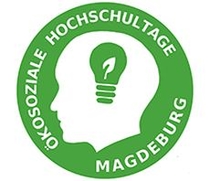
|
Helping to shape the Eco-Social University Days 2021
Hand on heart, how sustainably do you act in your everyday life? Maybe there is still a little room for improvement! How about, for example: Actively helping to shape the Eco-Social University Days 2021? Our sustainability office invites all interested employees to the planning meetings 2021. Together with students and committed Magdeburgers, the team wants to organize another week full of discussions, lectures, film evenings, readings, parties and much more around an ecosocial topic in June 2021. Get involved - help shape the event! Here you will find regular information about the meetings.
|
|
|
"Bestform 2021" competition
Every two years, creative minds from Saxony-Anhalt are honored with the "BESTFORM Award". Entries can be submitted for the fifth round of the competition. The first prize is worth 10,000 euros, and the Ministry of Economics is offering a total of 35,000 euros. New, creative, visionary ideas, products and services are eligible to win. Competition entries can be new ideas and concepts that have not yet been realized, or products and services whose market launch was no more than two years ago when they were submitted for the competition. The focus of the competition is on networks that demonstrate how all sectors can benefit from the local cultural and creative industries - and creative ideas that have the potential to compete in the marketplace in the future. These include: interdisciplinary collaboration, addressing demographic trends, initiating co-working spaces or using new digital technologies. Entries can be submitted until 12 noon on March 5, 2021. Further information on the competition and the opportunity to submit an entry can be found here.
|
|
|
Love letters against cultural death in Magdeburg
The association Magdeboogie invites people to write personal love letters to cultural sites and collectives in Magdeburg. Through the association's homepage, messages of solidarity can be shared until the end of February, encouraging people to persevere and reminding everyone that art and culture are an indispensable part of the city's social coexistence. The letters received via the homepage will be processed and subsequently handed over in printed form to the cultural creators and venues. Thus, the aim of the campaign is to transport the appreciation that would actually take place on site through the love letters. Until the end of February 2021, all culture lovers can participate in the action and thus also make contact with culture creators in the Lockdown. The "love letters for the cultural scene" can be written here. Participation is free of charge.
|
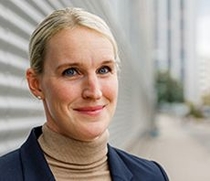
|
OVGU engineer now on the German Council of Science and Humanities
Prof. Dr. Julia Arlinghaus, Chair of Production Systems and Automation and Director of the Fraunhofer Institute for Factory Operation and Automation IFF in Magdeburg, has been appointed by the Federal President to Germany's most important science policy advisory body, the German Council of Science and Humanities. She will contribute her scientific excellence and science policy expertise there for three years and advise the federal and state governments on issues of content and structural development of the higher education system and government funding of research institutions. The focus of her research work is on designing and managing digital production systems and planning factory automation systems and digital transformation processes for industry. Read more
|
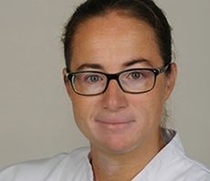
|
Award-winning research on inhalation therapy
Eva Lücke, M.D., from the University Department of Pneumology has received the sponsorship award of the Central German Society for Pneumology and Thoracic Surgery (MDGP). In her research work, the physician and scientist was able to provide important insights into the use of inhalers in the therapy of patients with chronic obstructive respiratory diseases. The award ceremony took place digitally at the MDGP annual meeting in December 2020. The prize is endowed with 5,000 euros. Read more |
Grants and Prizes |
|

|
Submission deadline extended!!! Call for Lectures informatica feminale 2021
The University of Bremen invites all female computer science faculty to submit teaching proposals for the 24th Informatica Feminale. The international summer university will be held in the Department of Mathematics and Computer Science from July to September 2021. Women professionals from academia and practice can submit their teaching proposals on current or fundamental topics in computer science by February 28, 2021. Course and lecture proposals from across the spectrum of theoretical, practical, technical, and applied computer science and its interdisciplinary connections are welcome. Female lecturers are invited to use the Summer University as an experimental field for innovative teaching and to try it out with highly motivated participants. Furthermore, female lecturers are invited with offers concerning studies, job and career. In addition, a focus program will be put together. Informatica Feminale and the concurrent Summer University for Women in Engineering see themselves as a network by and for women. The Summer University 2021 offers space and time for critical reflection and for a (preferably also experimental) examination of this connection between the understanding of technology and social developments. Courses that deal with the application of technical knowledge from computer science and engineering in different areas of work and life, such as care, education, health, nutrition, household, mobility, everyday networking, advertising, sports, militarization, etc. from a feminist perspective are welcome. Proposals for teaching events, discussion groups, workshops and lectures dealing with gender, gender justice, feminism, technology and ethics are very welcome. Every year, Informatica Feminale offers compact teaching on computer science for female students of all university levels and for women interested in continuing education. The focus is equally on entry into university, staying in university, career transition and lifelong learning at university level. At the same time, the summer study aims at the professional networking of female students and the in-service training of female computer scientists at university level. Detailed explanations and the registration form can be found at www.informatica-feminale.de/2021/call/
|
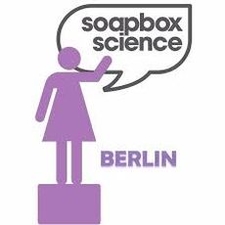
|
Become a speaker for Soapbox Science Berlin now!!!
Are you a woman working in STEM and Med (Math, Computer Science, Science, Engineering and Medicine) who is on fire for her research? Are you still waiting for the perfect opportunity to tell people about your work? Do you want to further your education in science communication? Then Soapbox Science Berlin is waiting for you! Apply now to become one of 12 speakers. Application deadline: February 28! Soapbox Science is a unique platform for public outreach. The events transform public spaces into a stage for public learning and scientific debate. In the process, the goal is to increase the visibility of women in science. This year's event will take place on June 26, 2021, from 2 - 5 pm, at Washingtonplatz near Berlin Central Station. Subject to change due to Corona. Please feel free to contact soapboxscience.berlin@gmail.com with any questions. Please see the event poster for all the information you need to read.
|
|
|
Call for Papers how ://are we talking #feminism?// new global challenges
Under the title "how ://are we talking #feminism?// new global challenges", the thematic issue FKW // Zeitschrift für Geschlechterforschung und visuelle Kultur planned for winter 2021/22 deals with the current revival and rearticulation of a historically powerful term. After feminism had somewhat faded into the background in favor of a seemingly more inclusive understanding of anti-discriminatory and intersectional diversity, i.e., after gender studies came into focus in the academic context instead of women's studies, it is currently experiencing an - increasingly net-savvy - political and cultural rediscovery. Protests, gender debates, slogans, and calls are once again running under the term "feminism," circulating via hashtags globally and presumably horizontally (e.g., #Feminism coupled with #Feminism). #Feminism coupled with #Outcry, #EqualPayDay, #FeministForeignPolicy, #BlackFeminismMatters, #ChildNotBride, #WhiteWednesday, #MosqueMeToo, #NotHeidisGirl, #FeministFriday, #GenderEquality, #EqualityMatters, #IchWill, #AccelerateAcceptance, #CripQueer, #LGBT, #LGBTQ, #LGBTQIA+, #WomenRightsAreHumanRights, #Post-Cyberfeminism...). Against this complex backdrop, the issue asks about the challenges of a global and decolonial as well as anti-discriminatory feminism and its dissonances - between lived bodies and public voices, between genealogical reference and (neoliberalist) exploitation machineries. The focus is thus on politics of recognition as well as moments of irritation, whose public range extends from sexism to new strategies of visibility and visibility pushes. The booklet is conceived as a glossary. It is intended to shed light on the new, partly disparate connotations, forms and transformations, visual languages and discourse productions with which #feminism is currently associated, which have been sparked since the 2010s, not least in the course of the #MeToo debate (subsequently #InclusionRider, #TimesUp). For the issue "how ://do we speak #feminism?// new global challenges", preferably hashtagged contributions are desired that are dedicated to the (new?) signifiers with which the forms of feminism in the 2020s can be expanded and enriched - ambivalences and misunderstandings included. Contributions (approx. 1- 2 pages) are invited on #concepts such as the already mentioned #BlackFeminismMatters, #MosqueMeToo, #GenderEquality, #equalitymatters, #IchWill, #accelerateacceptance, #LGBTQ, #WomenRightsAreHumanRights or #Post-Cyberfeminism..., also welcome are conceptualizations and combinations. The 70th issue will be bilingual, welcome contributions in English or German. Please send an abstract (approx. 200 words) and a short CV to Elena Zanichelli and to Valeria Schulte-Fischedick (please send to Anne Seiler: aseiler@msi.uni-bremen.de, who will also be happy to answer further questions) by March 1, 2021. The deadline for submission of the selected papers is June 15, 2021. The 70th issue will be published in winter 2021/22.
|
|
|
Bertha Benz Prize for Women Engineers 2021
In order to draw attention to the achievements of women in the engineering sciences and to encourage them to take up studies in these disciplines as well as to pursue a scientific career, the Daimler and Benz Foundation awards the Bertha Benz Prize annually to a female engineer who has completed an outstanding doctorate in Germany with a Dr.-Ing. degree. The dissertation is graded either "magna cum laude" or "summa cum laude". The prize is endowed with 10,000 euros. The deadline for submission is March 1, 2021. The governing bodies of universities and independent research institutes are eligible to submit proposals. Only one proposal can be submitted per faculty or per research institute. Further information can be found here.
|
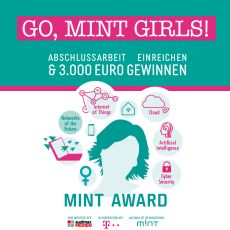
|
Apply quickly: Women's STEM Award 2021
The initiative "MINT Zukunft schaffen" is looking for outstanding bachelor and master theses on different topics together with cooperation partners. The final theses (BA/MA) may date back one and a half years and be written in German or English. The main prize is endowed with 3,000 euros, each growth field with 500 euros. Topics/growth fields: CLOUD, INTERNET OF THINGS, ARTIFICIAL INTELLIGENCE, CYBER SECURITY, NETWORKS OF THE FUTURE
|
|
CfP: Media and Inequalities (Trans-)national Perspectives on Gender, Diversity and Identity
The conference "Media and Inequalities (Trans-)national Perspectives on Gender, Diversity and Identity" of the sections "Media Public Sphere and Gender" and "International and Intercultural Communication" of the German Society for Journalism and Communication Studies (DGPuK), which has been postponed from 2020 to 2021 due to the Corona pandemic, will take place from September 22 to 24, 2021 at the Magdeburg-Stendal University of Applied Sciences. The deadline for submissions for contributions to the conference is March 31, 2021. Please see the detailed call here.
|
|
|
|
Call for Papers for the Conference "Diversity Digital Thinking - The Wider View"
For the conference of the Center for Teacher Education at WWU Münster, which will take place from September 8 to 10, 2021, papers are sought on the topic of the interconnectedness of digitization and heterogeneity. Digitization and heterogeneity are to be considered together: How do the two topics condition, complement, and reinforce each other? Both fundamental, learning-theoretical considerations as well as concrete applications and empirical findings are desired. In the sense of a "Wider View", the conference will take an equal look at approaches, challenges, and potentials in subject didactics, educational science, school science, and university didactics. The contributions are welcome to be interdisciplinary. Abstracts can be submitted until April 16, 2021. Further information can be found here. |
Events |
|
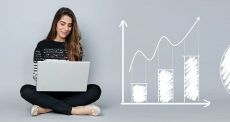
|
New series of events: From sex education to silversurfing
The German Education and Science Union (GEW) is offering a new digital event series on many topics related to women's, gender and equality policy. With "GEW and Equality," the GEW Women's Policy work area launched a new online event series on February 17, 2021. Every third Wednesday of the month, from 7:30 to 9 p.m., discussions are held via video conference - on sex education, all-day care, silversurfing, the Personal Status Act and much more. In addition to women's, gender and equality policy, the interests of queers and senior citizens will be discussed. Among other things, it will be questioned who sits in which position and can thus achieve what, who does the care work and ensures in the background that everything runs smoothly - and who is later threatened by old-age poverty. The corona pandemic sheds light on problem areas and shows how marginalized groups of people continue to face existential threats. The event series creates space for analysis, debate and new visions. An overview of all events in this series can be found here.
|
|
|
"Women move the world" - Parliamentary evening digital on March 02
Around the world, women are changing the world, whether on the streets, in laboratories, parliaments or as heads of government. Women can no longer be pushed back from decision-making positions. But even today, structural obstacles still hamper their progress. It is high time, however, that their experiences and perspectives shape political institutions and social processes. Measures are needed in many areas of our lives to break down barriers and make the representation of women at all levels a matter of course. Bündnis 90/Die Grünen cordially invites you to discuss together on 02 March 2021 on the occasion of International Women's Day: What is different when women lead and from which positive examples can we learn worldwide? What drives feminists, how do they support each other? Looking beyond our national borders, we want them to see how politics, business, science and culture change when women make decisions. They want to know what helped them on their way and how they pave the way for other women. For more information and to register, click here.
|
|
|
Inclusion and Accessibility in Teaching | multi-part online workshop starting March 02
The aim of the workshop "Inclusion and Accessibility in Teaching" is to provide participants with basic skills that will enable them to make their own teaching accessible and inclusive. Aspects of digital and analog teaching will be equally addressed. In the first event (March 2, synchronous), participants will receive a basic introduction to the topic of studying with disabilities and chronic illnesses, accessibility, and the corresponding legal foundations. In addition, the participants can exchange their own teaching experiences. On March 9 (synchronous), the participants will work together on the topic of inclusion in teaching. Methods for inclusive didactics in analog and digital courses will be presented and applied. On 16.03. (synchronous) the focus will be on accessible teaching materials. Participants will receive an introduction to the creation of accessible teaching and learning materials (with a focus on office applications). In the final event on 23.03. the participants have the opportunity to present the application of what they have learned by simulating a joint teaching event. The synchronous parts of the course will be followed by self-study phases (asynchronous). Registrations are possible until February 23, 2021 at https://www.kc-sachsen.de/news/inklusion-und-barrierefreiheit-in-der-lehre.html.
|
|
|
Political lunch on 04.03.2021: Role backwards? Covid-19 and gender equity
The Covid 19 crisis is not only putting a strain on the health care system, resulting in hundreds of thousands of cases of illness and tens of thousands of deaths, but is also having an impact on the income situation of various population groups. The sectors of the economy are also affected quite differently: While industry can largely continue to operate normally, the service sector - catering, trade, personal services - is affected to an above-average extent. In addition, many people are having to limit or even stop their gainful employment due to the reduced availability of childcare. At the political lunch on 04 March from 12:00-14:00, a closer look will be taken at the impact of the pandemic and the income situation of men and women. Are women particularly affected and if so, why and to what extent? What are the current scientific findings? Aline Zucco, Economic and Social Science Institute of the Hans Böckler Foundation, will speak. The Political Lunch Table is an event format of the FES Hessen, where new scientific findings and innovative political ideas are presented and discussed in a small circle at lunchtime. The focus is on open, controversial exchange and networking among participants. Further information on the event
|
|
|
Language and power - rhetoric training for women
Whoever is in charge has the power! Language plays an important role: it informs, manipulates, describes situations, constructs realities, conveys sensitivities and emotions. It is the heart of human communication. How do men behave towards women in conversations and vice versa? Are women "under-buttered" in communication, and if so, how does that happen? And if power is exercised through language, how can women counteract it through their linguistic behavior? In addition to basics and exercises on communication and body language, the seminar uses examples to present and practice strategies for conscious use of language. The goal is to assert oneself linguistically in professional and private situations. In addition, ways of dealing with unfair verbal attacks and quick-witted reactions are presented and practiced. The course is geared specifically to the needs of women. It is planned to hold the workshop on the premises of DAKS e.V. in Leipzig with the following times: However, due to the current pandemic situation, the workshop will most likely take place online as a substitute. Register via mail@daksev.de. Participation fees of 10 € p. p. will be charged.
|
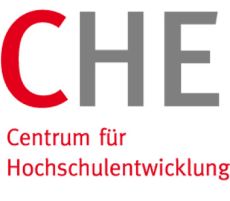
|
Pandemic Test for Universities: Online Conference on March 18 and 19, 2021
What lessons do universities take away from the Corona crisis for studying, teaching and management? The Corona Crisis has been and continues to be a major challenge for all of us and is asking a lot of us in many areas. One of those areas is higher education. What was previously a certainty, such as the attendance mode as the normal case in university teaching, is being called into question by the pandemic. However, the pandemic also brings new opportunities. For the online conference of the CHW (Center for Higher Education Development), the three important areas of "learning effects in study and teaching", "learning effects in family in higher education" and "learning effects for leadership in higher education" were singled out. The decisive factor in all three is that they are particularly influenced by the effects of the pandemic, especially the imperative to reduce contact. Specifically, prior to the crisis, the priority was on face-to-face instruction, adherence to core working hours, and on-site decision-making in committee and board meetings at the universities. However, because of the pandemic, new ways of doing things need to be quickly identified and made viable for different audiences. The good news is that after initial teething troubles, the potential of these new ways for future normal operations is becoming clear. The CHE Online Forum aims to make these issues and potentials visible and integrable into the daily university life of the participants. This online conference will take place over two days. You can book the event as a whole, as well as individual modules. Further information and the registration form can be found here
|
|
|
#mutzurpromotion - Digital GEW Seminar for doctoral candidates and doctoral students
This year's GEW seminar for doctoral candidates and PhD students will take place digitally for the first time from March 18 to 20 and on March 25, 2021. The seminar will focus on the question of whether everyone really does have the same opportunities for an academic career. The seminar will draw attention to forms of discrimination and unequal treatment, focus on their intersections and entanglements, and develop emancipatory counter-strategies in order to enable the ability to act. The program and the registration link can be found on the GEW homepage.
|

|
Gender Summit 2021: virtual meeting, April 14-16, 2021
The Gender Summit is a platform for dialogue where scientists, policy makers, gender researchers, and stakeholders in science systems examine new research that shows when, why, and how biological differences (sex) and sociocultural differences (gender) between women and men affect outcomes. The goal is to build consensus on where improvements in scientific knowledge and practice are needed and who should act. This year's Gender Summit has a special focus on Germany and is organized jointly with the German Research Foundation, acatech and the Alexander von Humboldt Foundation. Due to the Corona pandemic, the meeting will not take place on site in Munich as originally planned, but virtually. Therefore, a participation fee will be waived. Registration has recently opened. On the corresponding website there is information about the program and registration.
|
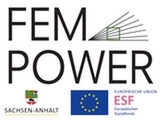
|
SAVE THE DATE Design Symposium: Women accomplices - A decentralized assembly for emancipatory design
Considering the special situation, the long planned symposium on gender and design, organized by the project FEM POWER at the BURG - Kunsthochschule in Halle, will take place as a hybrid event. From the evening of April 15 until deep into the night of April 16, 2021, the design symposium Women accomplices will take place. Let's not dwell on men's bikes and women's handbags. Let's talk about power and inequality and how design contributes to reproducing outdated notions of representation and identity constructions. Feminist critical debates are rapidly gaining relevance in design professions. At the hybrid gathering, you will ally and argue analog and digital in Halle and numerous decentralized locations, cook together, enjoy together, and arrange your futures. The event kicks off on Thursday evening with a "DINNERpreparationSPEECH". You are invited to join in the cooking, eating and chatting from the comfort of your own home. More info to follow at https://www.burg-halle.de/hochschule/organisation/gleichstellung/aktuelles/a/komplizinnen/ |
University and Politics |
|
|
Sign now: Joint declaration against sexism in science
Sexist transgressions are no exception in the everyday work of academics. Sexism and sexualized discrimination and violence are commonplace at German universities - just as they are in other areas of social life. All status and employee groups are affected by this, with dependency relationships and hierarchies often seriously exacerbating the problem. Anyone who would like to support the campaign can sign it online.
|
|
|
Study on coronal pandemic and working hours: gender gap remains
Women's average working hours fell more than men's during the coronal pandemic, widening the gender gap. This is the result of new data from the Hans Böckler Foundation's survey of the labor force from last November. One reason for the widening gap is likely to be that women in particular have taken on more care work during the crisis, for example in childcare, and have had to cut back on their careers in return. Read more
|
|
|
DFG: Equal Opportunities Monitoring 2020 published
The "Equal Opportunity Monitoring" reports annually on the participation of female scientists in DFG projects and on their proposal success as well as their representation in the DFG's statutory bodies. In the process, multi-year developments, the various disciplines and DFG programs are evaluated in a differentiated manner. The focus chapter of the 2020 report deals with "Women in Medicine". Both DFG programs and disciplines are examined comparatively. Additional data from DFG surveys and from the Federal Statistical Office allow an examination of the proportion of women at different career levels and a comparison with representation in the scientific system as a whole. You can find the current report "Equal Opportunity Monitoring 2020" as a PDF document here.
|
|
|
New GWK report on equal opportunities in science and research
The report on the "24th update of data (2018/2019) on women in universities and non-university research institutions" again shows that the proportion of female scientists has increased in both universities and research institutions, but that progress in all areas has been slow. When compared to data from the last ten years (2008-2018), there is a very modest increase, but they also demonstrate that the proportion of women is still declining with each qualification and career stage after graduation. This "leaky pipeline" means that considerable female qualification potential is being lost to the science system. The report is available online as a PDF document. Commenting on the findings, Jan-Martin Wiarda says: "If things continue at this linear pace, it will take until 2053 for professors to achieve parity, and even until 2056 for non-academics." You can read the commentary on Wiarda's blog.
|
|
|
Explainer videos on gender aspects in selected STEM fields
As part of the EU project GEECCO, Brigitte Ratzer and Bettina Enzenhofer from TU Wien have created short explanatory videos on gender aspects in selected STEM fields (robotics, HCI, energy, mobility). They are aimed in particular at researchers, research funding, jury members, politicians and can also be used in training courses. A more detailed presentation of the topics as well as the links to the individual videos can be found at http://www.geecco-project.eu/resources_results/geecco_material/
|
|
|
Crossing Boundaries and Distancing - Gender Research in University Restrooms
When Bielefeld University had four toilet rooms converted into all-gender toilet rooms in 2018, the AStA said that the "'relabeling of toilets' was only a 'small step towards a gender-equitable university'" (Rother 2018). That the measures were not only welcomed is shown by the anonymous damage to the toilet rooms after the remodeling measures. Toilet rooms thus become negotiation sites for the question of how society deals with people who elude clear classifications of female or male. In order to approach the question of how gender is produced as social meaning in social practices, researchers have investigated the women's, men's, and all-gender restrooms at Bielefeld University using a qualitative mix of methods. Continue reading
|
|
|
Equal opportunities in STEM professions
Girls are already being introduced to scientific studies through various projects during their school years, but what about the promotion of equal opportunities after graduation? Michaela Paefgen-Laß explores this question and states: "If women in male-dominated professions are deprived of the chance to pursue a career because gender roles, stereotypes and structural inequalities continue to determine their lives, this leads all efforts to promote girls and women in STEM professions straight to nowhere. Where the female engineer has a natural right to promotion based on her education and skills, old boys networks and entrenched role understandings must take their place." You can read the full article here.
|
|
|
Mother usually comes without * - As a mother and feminist in science
Every year on February 11, the International Day of Women and Girls in Science points out that women are still underrepresented in research. The widely held opinion: because, after all, they have children to raise. At the same time, female academics in particular are rarely prepared for what awaits them as mothers. Rather, they "dare to go on a blind date, but without the option of changing their mind after the first meeting" (p. 118), according to agricultural scientist Franziska Appel in the book Mutterschaft und Wissenschaft. A refreshing publication in more ways than one. Continue reading
|
|
|
Higher education in times of crisis. A Qualitative-Explorative Study on the Experience of the Corona Pandemic among University Teachers and Students
Under the direction of Doctor Hanna Haag from the University of Applied Sciences Zittau/Görlitz and in cooperation with the Humboldt University Berlin, a qualitative-explorative study on the experience of the Corona pandemic among university lecturers and students will be conducted until February 2021. The project addresses the question of how the current situation following the nationwide exit and contact restrictions in the wake of the Corona pandemic is experienced by faculty and students at German universities and what challenges arise for the aforementioned stakeholder groups. Further details as well as research questions and background can be found on the project page of the Institute for Transformation, Housing and Social Spatial Development of the HSZG.
|
|
|
Outside the Norm - "Ableism in Academia"
Recently edited by Nicole Brown and Jennifer Leigh, "Ableism in Academia" is the first conference volume to attempt to theorize experiences of people with disabilities and chronic illnesses in the academic system. Using a range of perspectives and theories, such as feminism, post-structuralism, and theories of embodiment, it aims to increase awareness and understanding of marginalized academics. The book is available in English as an open access PDF. |
|

Thank you very much for your interest! You are welcome to forward the newsletter. To register, please send a message to gleichstellungsbeauftragte@ovgu.deor register on the Website. |







